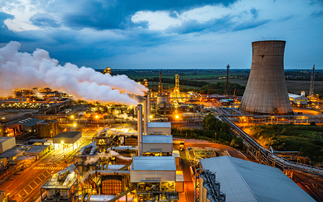The IPCC report is bleak in the extreme with glimmers of hope - that leaves no alternative for green businesses but to keep on keeping on
You left me standin' in the doorway cryin'
In the dark land of the sun.
Standing in the Doorway, Bob Dylan
What will you miss most, the coral reefs or the glaciers? Today's long-awaited IPCC report on how to avert 1.5C of warming above pre-industrial levels somehow manages to be even bleaker than expected. There is nothing new here, the report is a summary of thousands of already published papers and as such the key headlines will be familiar to anyone who has even a passing interest in climate change. But seeing the familiar analysis gathered together in one place has its own hard-hitting power - even with, or perhaps because of, the way every line has passed through the prism of consensus and been distilled to the driest of academic language.
The real hammer blow comes not with the climate impacts that would still be felt under 1.5C of warming, the loss of 70 to 90 per cent of the world's corals, the prospect of well over half a metre of sea level rise, the near certain undermining of critical agricultural yields. Nor is it felt with the even more damaging impacts that would be unleashed by 2C of warming, the near complete destruction of corals, the further 10cm of rising seas, the even more significant impacts on food production and prosperity in the world's poorest nations.
No, the report's starkest message is found in just one paragraph in the Summary for Policymakers. The line that admits that even if the emissions reductions pledges contained in the Paris Agreement - a treaty the world's largest economy has pledged to leave, lest we forget - are met and built upon we would still see 3C of warming this century. If the difference in the climate impacts between 1.5C and 2C is terrifying, then the difference between 2C and 3C is unconscionable. With remorseless timing the IEA today confirms that instead of seeing global greenhouse gas emissions peaking, we are set to see a second consecutive year of rising emissions.
And it gets worse, because the report further confirms what we already knew: moving from that 3C trajectory to a 1.5C trajectory is a Himalayan challenge that is utterly unprecedented in its scope and scale. The passive tone with which the targets are explained does nothing to dilute their epoch-shaping implications. To have a reasonable chance of keeping temperature increases below 1.5C we need to cut greenhouse gas emissions 45 per cent by 2030 and build a net zero emission economy by 2050. If that sounds unfeasibly challenging the goals for 2C of warming are not much better, requiring emissions cuts of 20 per cent by 2030 and a net zero economy by 2075. And these goals are mid-range estimates, the climate's response to spiralling concentrations of greenhouse gases may give us a little more breathing space, or it could trigger tipping points and runaway emissions earlier than feared.
Debra Roberts, co-chair of IPCC Working Group II, is right when she says "the next few years are probably the most important in our history".
But it is also important to remember that as bleak as it may appear the IPCC report is in fact inherently optimistic.
The very commissioning of it was an act of optimism and resistance from those low-lying island states with the most to lose if temperature increases exceed 1.5C.
The focus on 1.5C and 2C, rather than 2.5C or 3C or worse, was the whole point of the exercise, but it does risk giving policymakers the impression the choice is between climate outcomes that are 'bad' and 'worse', not 'bad', 'worse', and 'catastrophic'. Sketching out how to move onto a 1.5C pathway at a time when emissions are still rising, makes it feel a little like one of the most comprehensive scientific reviews ever undertaken is basically the equivalent of hiring Team Sky to spend two years analysing every last detail of what it would take to win the Tour de France with, well, me.
This optimism runs through the report and is most apparent in its insistence that the scale of economic and industrial transformation required to temperature keep increases under control may be unprecedented but is "within the laws of chemistry and physics", as Jim Skea, Co-Chair of IPCC Working Group III, puts it. The Summary for Policymakers adds an intriguing coda to the unprecedented nature of the transformation that is required, declaring that the emissions reductions pathways required in energy, land, infrastructure, and industry "are unprecedented in terms of scale, but not necessarily in terms of speed". "The rates of system changes associated with limiting global warming to 1.5C with no or limited overshoot have occurred in the past within specific sectors, technologies and spatial contexts, but there is no documented historic precedent for their scale," it adds.
This analysis is extremely comforting and has been cited plenty of times in the past by climate hawks (myself included). For example, the way in which the IT industry has transformed the world inside three decades provides the most compelling evidence yet that deep decarbonisation at the pace required may just be possible. The whaling industry, the horse and cart, the fax machine, all went from ubiquity to antiquity in the space of a decade or two. But equally this analysis risks providing false comfort when set against the fact similar transformations are required globally and in every single industry, including multiple sectors that are nowhere near as agile as the disruptive gurus of Silicon Valley. It is a bit like saying Usain Bolt can run 100 metres in under 10 seconds, so everyone can, and indeed must.
How bad could it get? The answer to the question depends to some extent on your imagination (and, yes, I know this sentence is a hostage to cherry-picking climate sceptics who are no doubt scouring today's report and its resulting coverage for the handful of lines that fit into their cavalier world view).
The IPCC's report is a scientific review. It tells us a lot, but it is inevitably and necessarily an exercise in scenarios and uncertainties. Even in the areas determined by raw physics there is a range of projected impacts taking in best cases that are bad and worse cases that are catastrophic (I can't stop thinking about those corals). But as soon as the report seeks to extrapolate how climate impacts that we can predict with a high degree of confidence will impact everything from agricultural yields to economic growth things get a little murky. There are too many fine-point variables and too many second and third order impacts to assess with any absolute confidence.
Whether it is a result of political pressure or a completely understandable reluctance on the part of scientists not to highlight impacts that they do not yet have a high degree of confidence in is still the subject of debate. But it remains notable that the Summary for Policymakers fails to highlight the economic and security risks that could come with climate-induced migration, nor give over more space to the possible, if unlikely, risk that even at less than 2C of warming certain emissions feedback loops could come into play, raising with them the spectre of runaway warming. The IPCC does acknowledge the risks associated with relying on theoretical negative emissions technologies, but it is arguably here that the scientific language underplays the huge scale of these risks and moral hazard associated with even a hypothetical reliance on soaking emissions back out of the atmosphere.
What happens if sea level rise of just half a metre under a 1.5C scenario combines with storm surges to inundate Miami or Dhaka on a semi-regular basis? Does investment in sea defences or managed migration minimise any impacts, or will the rising seas unleash sectarian tensions and trigger a global economic crisis? Given the global financial system nearly collapsed due to a few thousand bad mortgages in Albuquerque, I'm not overly hopeful the economic system is genuinely resistant to seafront properties succumbing to the waves.
What happens if even modest reductions in agricultural yields occur? Does investment in R&D and soil resilience measures keep overall yields on an upward tick, or will a steady erosion in agricultural output lead to the horrendous escalation of the currently worsening levels of global hunger that the UN is already attributing, in part, to climate impacts?
And how should businesses respond to these full spectrum risks?
The big upside of this report is there is now a clear, easily articulated goal. It takes the evolving concept of net zero and places it front and centre in the eye-line of policymakers and business leaders everywhere. It explains clearer than ever before that the only way to ultimately bring climate change and the huge risks associated with it under control is build a net zero emission economy.
Practically speaking, the message for business leaders from scientists is, as Greenpeace's Kaisa Kosonen paraphrased, 'act now, idiots'. It is a stark reminder to embrace every form of obviously achievable emissions reduction that is now on offer from energy efficiency improvements, low cost renewables, and low emission vehicles - the technologies and practices that deliver genuine cost savings and business benefits. It is also a recognition that R&D investment is utterly essential. Incremental emissions savings will no longer be sufficient and as such businesses and investors need to explore and deliver disruptive technologies and business model transformations. And it is a reminder that climate adaptation needs to be pushed up the agenda. Even at 1.5C of warming supply chain disruption and insurance costs could soar without serious steps to bolster resilience.
Most important of all in the short term, there is the urgent need to stop doing stupid things. Stop investing in coal and other forms of locked in, high carbon infrastructure; stop burying heads in the ever hotter sand.
However, the dilemma for individual businesses trying to process the bleak reality contained in the IPCC report is much the same as the dilemma faced by the public: what can one business, one person do?
The answer is that 1.5C, or even 2C, trajectory will only be achieved by systems change - a full-blown transformation of infrastructure and economic models. That requires genuine leadership from policymakers and as such arguably the biggest impact a business can have is in using every last ounce of corporate muscle and political leverage to make the case for economy-wide action to build a net zero emission economy as swiftly as possible.
The harsh truth is that the IPCC's warning that mitigating climate risks requires an unprecedented transformation undersells it. There is nothing in human history, psychology, or society to suggest the scale of emissions reductions that are required can be achieved in the timescale available. That said, there is just about enough human ingenuity and human bravery to suggest that while there is the faintest glimmer of hope the fight against climate breakdown must continue. As a brilliant op ed in the New York Times yesterday from Auden Schendler and Andrew P. Jones explained, "stopping climate change is hopeless - let's do it". Climate Home News' Karl Mathiesen may have been right to observe this argument means we "have entered the 'imagine Sisyphus happy' end of the hope spectrum", but here we are.
The task may be daunting in the extreme, but there are three arguments that can provide succour, all of which can be filed under the heading 'what else ya gonna do?'
Firstly, the vast majority of decarbonisation measures deliver myriad net benefits for businesses and the public alike. They result in lower costs, lower risks, cleaner air, and improved health. From renewables and electric cars to energy efficiency and greener diets, the reasons not to embrace low carbon practices are falling away faster than a retreating ice cap.
Second, the IPCC's assertion that rapid industrial transformations have happened in the past does stand. It may be the longest of long shots, but development is not linear and in a digitally connected world disruptive change can reshape entire economies in short order.
Finally, there is no end point to your engagement with climate change. 1.5C is better than 2C, but 2C is better than 3C and 3C is better than 4C. A net zero emission economy has to built at some point if runaway warming and genuine planetary scale catastrophe is to be averted. We might as well get on and build it sooner rather than later.
It's bleak, but it's not dark yet. There is no alternative but to keep on keeping on.









